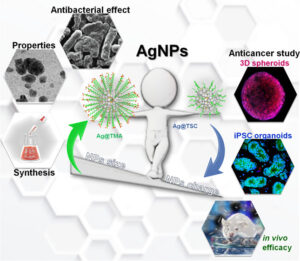Recently, a paper titled Synthesis and Characterization of Size- and Charge-Tunable Silver Nanoparticles for Selective Anticancer and Antibacterial treatment has been published in ACS Applied Materials & Interfaces, whose co-author – mgr Mariusz Borkowski, is a PhD Student at our Institute of Catalysis and Surface Chemistry PAS (group: “Interactions of dispersed systems”). The research outcomes have been published, as a result of a cooperation between the Faculty of Chemistry UJ and Małopolska Centre of Biotechnology.
5, 10, or perhaps 15? Of how many nanometers should nanoparticles be made, for them to exhibit antibacterial properties? On the other hand, what should be the nanoparticles’ size, in order for them to be effective in anti-cancer therapy? The paper’s authors were the first to present a method of synthesizing silver nanoparticles of controllable size, and charge, in an aqueous environment. During the research, one of the encountered challenges has been producing uniformly sized nanoparticles, which is a difficult task to be conducted in biocompatible solvents. The nanoparticles size uniformity is considered crucial since it affects the potential applications of the material. In this work, the authors demonstrated that the size, and the charge of nanoparticles, may be altered, depending on the criteria imposed by specific practical applications, while preserving their stability and activity in an aquatic environment.
The team led by dr hab. Janusz Dąbrowski, prof. of the Jagiellonian University, investigated the effectiveness of the newly synthesized Ag nanoparticles, and discovered a link between the nanoparticles’ parameters, such as size and charge. As an outcome – there is a possibility of controlling the nanoparticles’ biological activity. Scientists have shown that positively charged nanoparticles, with a size of 10 nm, eliminate 100% of E. coli, whereas, those characterized by a diameter of 40 nm, can selectively destroy breast and colon cancer cells (3D models), without significantly harming normal cells. The research conducted on in vivo models has validated the safety and effectiveness of Ag nanoparticles. Moreover, a long-term inhibition of the growth of colon tumors in mice, that were given silver nanoparticles, has been observed. This resulted in significantly prolonging the life of the tested animals, in comparison with the control groups. The proposed novel synthesis method of Ag nanoparticles may be a particularly promising way to obtain highly active, selective antibacterial, and anti-cancer drugs.
